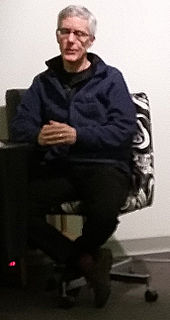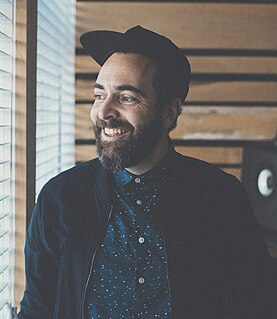Electroacoustic music is a genre of Western art music in which composers use technology to manipulate the timbres of acoustic sounds, sometimes by using audio signal processing, such as reverb or harmonizing, on acoustical instruments. It originated around the middle of the 20th century, following the incorporation of electric sound production into compositional practice. The initial developments in electroacoustic music composition to fixed media during the 20th century are associated with the activities of the Groupe de recherches musicales at the ORTF in Paris, the home of musique concrète, the Studio for Electronic Music in Cologne, where the focus was on the composition of elektronische Musik, and the Columbia-Princeton Electronic Music Center in New York City, where tape music, electronic music, and computer music were all explored. Practical electronic music instruments began to appear in the early 1900s.
René Lussier is a jazz guitarist based in Montreal, Quebec, Canada. He is a composer, guitarist, bass guitarist, percussionist, bass clarinetist, and singer. Lussier has collaborated with Fred Frith, Chris Cutler, Jean Derome, and Robert M. Lepage. He combines elements from several genres and is often referred to within the discourse of contemporary classical music or Musiques Actuelles in French.
David Kristian is a Canadian musician and film score composer and sound designer.
Philip Sherburne is an American journalist, musician and DJ based in Barcelona. He coined the term "Microhouse" and appeared in the film Speaking in Code.
Founded in 1986, La Communauté électroacoustique canadienne / The Canadian Electroacoustic Community (CEC) is Canada's national electroacoustic / computer music / sonic arts organization and as such is dedicated to promoting this progressive art form in its broadest definition: from "pure" acousmatic and computer music to soundscape and sonic art to hardware hacking and beyond.

Philippe Jaroussky is a French countertenor. He began his musical career with the violin, winning an award at the Versailles conservatory, and then took up the piano before turning to singing.
Christian Calon is a French-born Canadian composer who is active in electroacoustic music. He has worked extensively in large computer-based studios in Canada and Europe and has received commissions from the Canada Council, the Groupe de Musique Expérimentale de Marseille, and the Ministère des Affaires culturelles du Québec. His work is written in an expressionist and narrative style and his pieces are characterized by acousmatic diffusion.
Yves Daoust is a Canadian composer who is particularly known for his works of electroacoustic music. He currently resides in Montréal.
Jonty Harrison is an electroacoustic music composer born 27 April 1952 in Scunthorpe, UK, and currently living in Birmingham, UK.

Szkieve is the stage name of Dimitri della Faille. Szkieve is a pioneering ambient musician and new media artist. He has been performing electronic experimental and noise music since 1997. In 2017, he was co-awarded the prestigious Golden Nica Prix Ars Electronica in digital musics and sound art.
Stéphane Roy is a Canadian electroacoustic music composer and writer on music. An associate composer of the Canadian Music Centre, his works have received awards from international competitions in Canada, the USA, and Europe. He currently teaches electroacoustic techniques and auditory perception at the Université de Montréal and is also a faculty member at the Conservatoire de musique du Québec à Montréal. He is the current vice-president of the Canadian Electroacoustic Community He lives in Greenfield Park, Quebec, Canada.

Timothy Wesley John Brady is a Canadian composer, electric guitarist, improvising musician, concert producer, record producer and cultural activist. Working in the field of contemporary classical music, experimental music, and musique actuelle, his compositions utilize a variety of styles from serialism to minimalism and often incorporate modern instruments such as electric guitars and other electroacoustic instruments. His music is marked by a synthesis of musical languages, having developed an ability to use elements of many musical styles while retaining a strong sense of personal expression. Some of his early recognized works are the 1982 orchestral pieces Variants and Visions, his Chamber Concerto (1985), the chamber trio ...in the Wake..., and his song cycle Revolutionary Songs (1994).
Maybe Monday is an American experimental electroacoustic improvisation music ensemble comprising guitarist Fred Frith, koto player Miya Masaoka and saxophonist Larry Ochs. The trio was formed in San Francisco in March 1997 when they performed in a concert at the Great American Music Hall. They have since toured the United States, Canada and Europe, and released three albums between 1999 and 2008.

Jean-Philippe "Jean-Phi" Goncalves is a percussionist and record producer based out of Montreal, Quebec, Canada.
Myke Roy is a Canadian composer and recording engineer. An associate of the Canadian Music Centre and a member of the Canadian Electroacoustic Community, his compositional output includes a substantial amount of electroacoustic music, instrumental music, multi-media works, and music for the theatre. In 1976 he was awarded the Sir Ernest MacMillan Award/Fellowship by the Composers, Authors and Publishers Association of Canada for his works Sveln, Dra-men Dzunkt and Tsé Tnant/Te Deum. In 1987 he won the Robert Fleming Prize.

Guillaume Couture was a Canadian choir conductor, composer, music critic, and music educator. Although he never pursued a performance career, he is particularly remembered for his work as a voice teacher, having taught many notable Canadian singers. He is the grandfather of composer Jean Papineau-Couture.
Clinker is a Canadian sound artist, composer, and visual artist from Edmonton, Alberta. Recent work includes the live cinema piece On the Other Side... , commissioned by the 2008 Leonard Cohen International Festival in Edmonton, Alberta as well as the soundtrack for the documentary Dirt.
Marc Battier is a composer and musicologist.

Kara-Lis Coverdale, also known as K-LC, is a Canadian composer, musician, producer, based in Montreal, Quebec. Coverdale is known equally for her piano, organ, and keyboard work as she is for her experimental electronic projects; often her work integrates the two, blurring the lines between traditional composition and research-based modernism. Her 25 minute album Grafts (2017) was named an album of the year by Noisey, Crack, Boomkat, Resident Advisor, Tinymixtapes, and more.
Régis Huby is a French jazz violinist, composer, and arranger.





